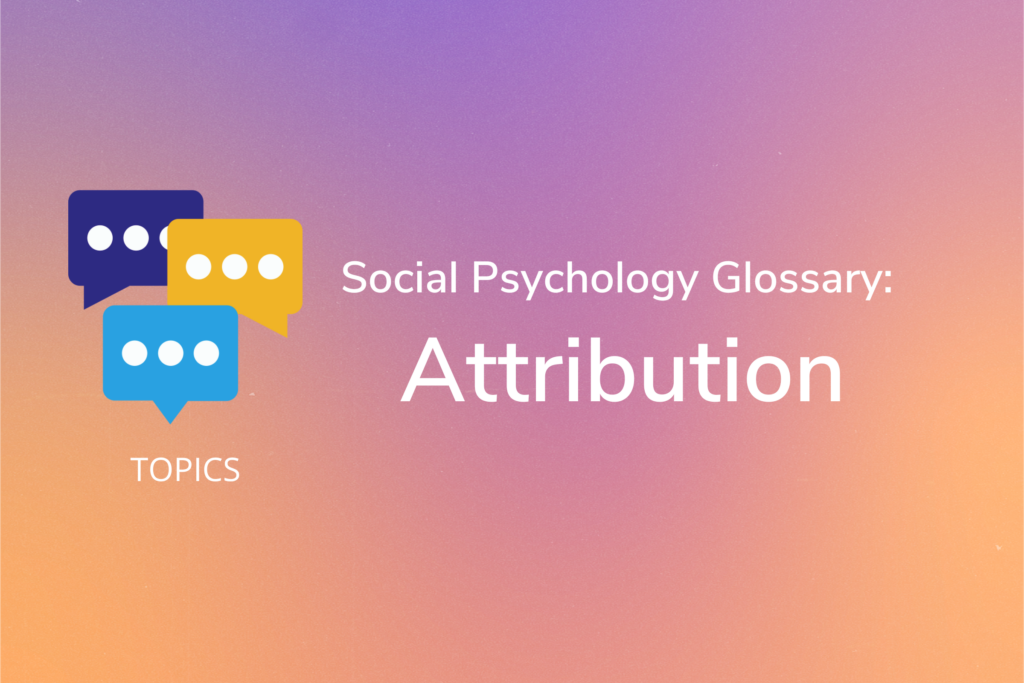Welcome to the Social Psychology Glossary!
In these posts, I will explain Social Psychology terms and theories and add some examples from research.
These terms and theories help social psychologists understand how people perceive others, interact with them, and make judgments about the social world and its members. These psychological processes can impact well-being and decision-making: being aware of their existence is a key factor that helps individuals and society to move towards gender diversity, gender equality, and equality in general.
Today we will explain what Attribution is.
Let’s start!
Attribution
Imagine this situation that probably happens quite often: you see someone doing something, and you can only see that action. For example, you see a person sitting alone in a pub on a Saturday night. What happens in your brain then? Your brain probably builds an explanation for that behavior: Why is that person alone? Did it happen because they like being alone? Or are they waiting for someone who is not showing up?
Both these possibilities are trying to explain why the situation is as it is, and you are making attributions. In other words, you make attributions when you try to explain the causes of an event. Attributions can differ in multiple ways. The first option, for example, that assumes the person is enjoying being alone, is an internal attribution: the cause is found within the actor. The second option, in which the person is waiting for someone who is not showing up, is an external attribution: the cause is found outside of the actor.
We make these attributions quite often. Attributions are not always rational, and they may not accurately represent reality. Sometimes we create these explanations without being aware that we are doing so. Moreover, we are not aware that they structure our thinking patterns with relevant consequences. I will now show you two examples of how attributions influence thinking patterns.
First, this simplified distinction between internal and external attributions is associated with the beliefs in our own abilities. When we fail at something, we can infer attributions. We may believe that the situation happened because of us, of some traits or some “flaws” we have: this is an internal attribution and it would be difficult to change. On the contrary, we may believe that the situation was caused by external factors, and things can be better if the contextual factors change. The first perspective shows a helpless situation, in which little can change. The second perspective, instead, leaves us more space to change, improve, or find new solutions for ourselves. When something negative happens, internal attributions are associated with pessimism more than external attributions.
The second example starts from a more societal perspective. When men encounter setbacks in science, technology, engineering, and math (i.e., STEM) fields, in fact, setbacks are usually explained with an external attribution. When women encounter setbacks in STEM fields, instead, setbacks are more frequently explained with internal attributions. In other words, men encounter setbacks in STEM because of external factors, while women encounter setbacks in STEM because of personal, internal factors. This biased process is called stereotypic attribution bias, and implicitly maintains stereotypical beliefs about women.
The main takeaway message of this post is probably that how we explain things influences many different beliefs we have. Each one of us can have a unique way of attributing causes. These ways are called attributional styles, and they are the topic of our next post.
Suggested readings
- Kelley, H. H., & Michela, J. L. (1980). Attribution theory and research. Annual Review of Psychology, 31: 457–501.
- LaCosse, J., D. Sekaquaptewa, and J. Bennett. (2016). STEM stereotypic attribution bias among women in an unwelcoming science setting. Psychology of Women Quarterly, 40 (3):378–97. doi:10.1177/0361684316630965.

Train the sponsor — Implementation of a new mentoring training (UK)
